Crimes Against Humanity (194 found)
Atrocities Prevention Report: Targeting of and Attacks on Members of Religious Groups in Burma
The situation in Rakhine State is grim, in part due to a mix of long-term historical tensions between the Rakhine and Rohingya communities, socio-political conflict, socio-economic underdevelopment, and a long-standing marginalization of both Rakhine and Rohingya by the Government of Burma […]
• • •Human Rights situation in Burma/Myanmar
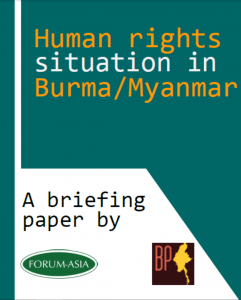 The year 2015 will be remembered as a momentous year for Burma/Myanmar as the National League for Democracy (NLD), led by Daw Aung San Suu Kyi, clinched an emphatic victory in the 8 November polls. However, the main challenges that impede a full and genuine democratic transition remain.
The year 2015 will be remembered as a momentous year for Burma/Myanmar as the National League for Democracy (NLD), led by Daw Aung San Suu Kyi, clinched an emphatic victory in the 8 November polls. However, the main challenges that impede a full and genuine democratic transition remain.
Myanmar: Annual Report Country Entry 2016
Authorities failed to address rising religious intolerance and incitement to discrimination and violence against Muslims, allowing hardline Buddhist nationalist groups to grow in power and influence ahead of the November general elections […]
• • •Facing 377 Discrimination and Human Rights Abuses Against Transgender
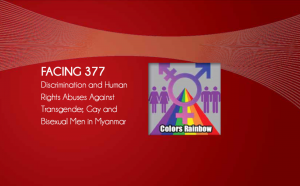 Following military coups in 1962 and 1988, multiple military regimes have ruled over Myanmar (formerly known as Burma). Widespread human rights abuses conducted by police and military against the general public and ethnic minorities are well known and documented […]
Following military coups in 1962 and 1988, multiple military regimes have ruled over Myanmar (formerly known as Burma). Widespread human rights abuses conducted by police and military against the general public and ethnic minorities are well known and documented […]
Sticks and Stones: Hate Speech Narratives and Facilitators in Myanmar
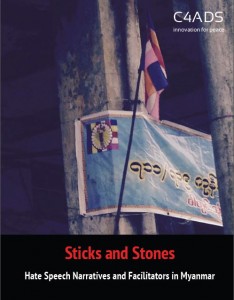 Conditions for Muslims have steadily declined in Myanmar, with the Rohingya Muslims of Rakhine State facing the gravest threat. In 2012, the country was rocked by the worst sectarian violence in over 50 years, resulting in over 200 killed and 140,000 displaced, most of them being the Rohingya […]
Conditions for Muslims have steadily declined in Myanmar, with the Rohingya Muslims of Rakhine State facing the gravest threat. In 2012, the country was rocked by the worst sectarian violence in over 50 years, resulting in over 200 killed and 140,000 displaced, most of them being the Rohingya […]
The Meaning of Land in Myanmar
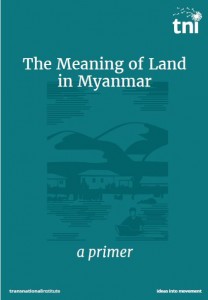 “Land is like our vein; it is vital for our living. After our land was confiscated, we don’t know what to do for our livelihood,” says a farmer from Kachin State in Myanmar […]
“Land is like our vein; it is vital for our living. After our land was confiscated, we don’t know what to do for our livelihood,” says a farmer from Kachin State in Myanmar […]
Medical Crisis for Political Prisoners of Letpadan Case
There has been a significant deterioration in the health and well-being of 53 students and supporters who have been detained without bail for nine months at Thayawaddy prison. Their criminal trial has now dragged on for nine months. If convicted, they could face up to ten years in prison […]
• • •Justice Delayed, Justice Denied
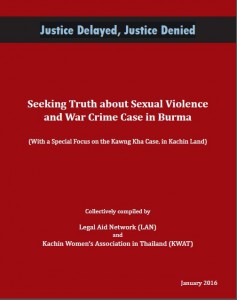 Despite the so-called democratic transition taking place since 2010, Burma remains constitutionally under the control of the Armed Forces. However, our national democratic icon, democratic forces, some ethnic armed organizations, many NGOs — especially GON¬GOs – and most of the international community are siding with or exercising a policy of appeasement with the power holders, without scrutinizing whether the source of their pow¬er emanates from the genuine will of the various ethnic nationalities and/or indigenous peoples […]
Despite the so-called democratic transition taking place since 2010, Burma remains constitutionally under the control of the Armed Forces. However, our national democratic icon, democratic forces, some ethnic armed organizations, many NGOs — especially GON¬GOs – and most of the international community are siding with or exercising a policy of appeasement with the power holders, without scrutinizing whether the source of their pow¬er emanates from the genuine will of the various ethnic nationalities and/or indigenous peoples […]
Government Troops Attack Ta’ang Village in Lashio, Killing two Villagers, one Mentally Disabled
On January 4, 2016, Burma’s Independence Day — celebrated with military parades in Naypyidaw and Yangon — government troops attacked a Ta’ang village in Lashio township, northern Shan State, killing two villagers, including one who was mentally disabled […]
• • •Killing, Disappearance, Land-mine Death During Burma Army Offensive in Central Shan State
This update documents further incidents of abuse against civilians committed by Burmese government troops during their offensive in central Shan State since early October 2015. SHRF has documented the killing of a displaced farmer on November 13, and the disappearance of another, near Mong Ark, Mong Hsu township […]
• • •
 All posts
All posts